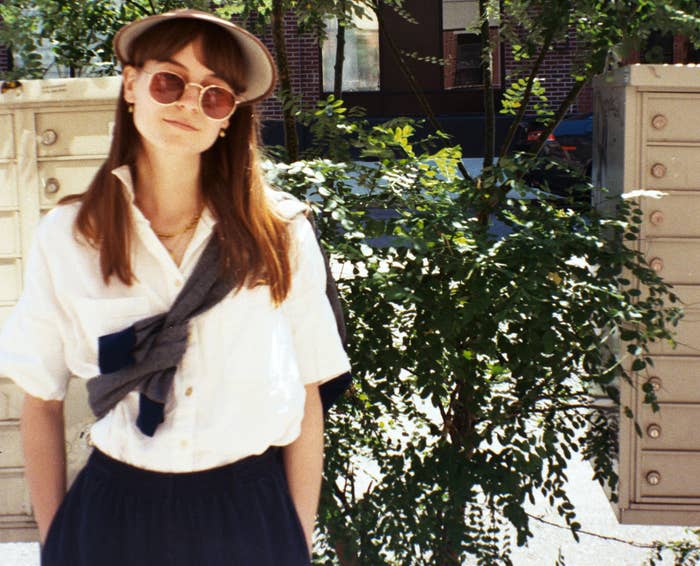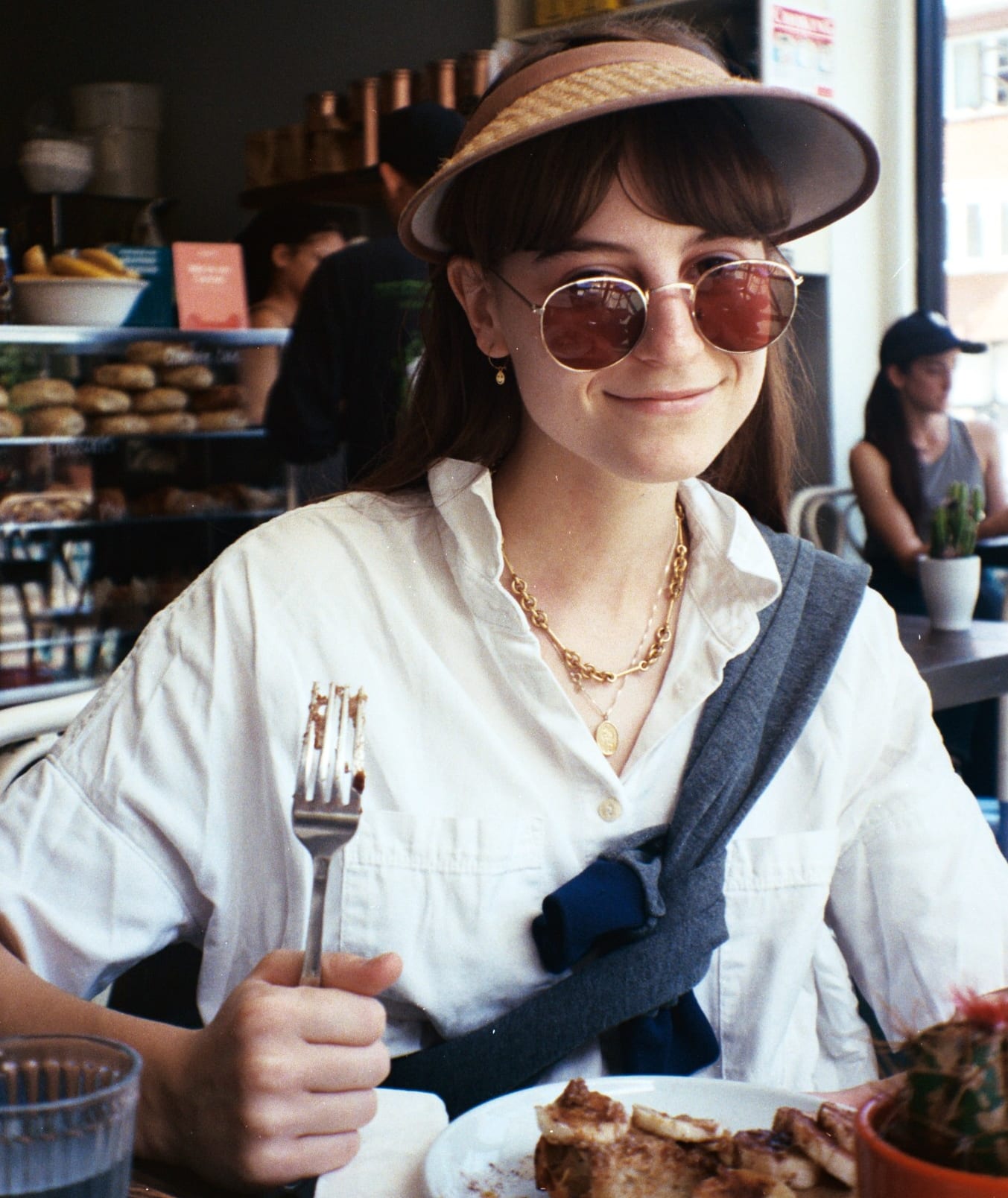
Even in Brooklyn, where the summertime fits are in full swing, Faye Webster stands out. Though freshly 22, the singer more closely resembles a sepia-tinged photo of your grandfather, decked out in loose-fitting trousers, a white button down, and sharp Oxfords, tastefully accented with gold jewelry, brown-lensed sunglasses, and a straw visor. Unlike the Bed-Stuy café we’re sitting in, which is also a wine bar, and whose artwork includes both a poster of different mushroom types and one of a pig suspended in midair next to a regal-looking column, the brand is strong.
It’s 10 a.m. on a Thursday morning, and the sun is already beating through the windows; Webster requests that we sit further away from them. The Atlanta native is wrapping up a two-week headlining tour, the New York City leg having taken place the night before at Baby’s All Right. I ask her how she thinks the show went.
“It was… good,” she says, settling into both her answer and a blue, black, and white metal chair. “It was hot in there, and some weird stuff was happening, but overall I think it went well.”
I've never read a write-up on me and been like, 'That's it. That's the one.' It's always like, ‘R&B for homebodies’—I don't even know what that means.
The weird stuff included a fight that broke out after the show (I thought someone had been groped, she heard that someone spit on someone’s boyfriend), someone in the crowd getting thrown up on (they replaced their shirt with a purchase from her merch table), and the fact that not a single attendee brought her scratch-offs (she’s been posting her winnings from each show on her Instagram story). Someone did bring her a stuffed pigeon, though, a reference to one of her newest songs.
Webster’s third record, Atlanta Millionaires Club, has been out for just over a month, and has already become a cult hit. The previous night’s sold out show featured a diverse crowd of swayers and swooners, a testament to both her appeal and the continued obsolescence of “genre.” In keeping with the traditions of modern popular music, the album is difficult to define; drenched in pedal steel guitar and surf-y drums, it’s part country, part alternative, part Americana.
“I've never read a write-up on me and been like, ‘That's it. That's the one,’” she notes, adjusting the gray sweater tied diagonally across her torso. “It's always like, ‘R&B for homebodies’—I don't even know what that means. I don't know how to explain the record; I think it'd be alternative.”
Critics’ tendency to bring up R&B and hip-hop when discussing Webster’s music likely comes from her affiliation with Awful Records. When she was a senior in high school, Awful was “the thing in Atlanta.” The aspiring singer connected with the label’s Ethereal and Eat Humans over social media, initially as a fan and friend, and began frequenting the collective’s shared home. Eventually, Ethereal, who is featured many times throughout the young creative’s Instagram page, approached Father about making things more official. Soon, an alt-country singer was signed to the same label where Playboi Carti got his start. “I was definitely the outlier,” she admits. “But I always felt at home at Awful.”
Though a fan of R&B and hip-hop, the songstress, who is now signed to Secretly Canadian, believes the description of her own music as such is misleading, joking, “What if people come ready to hear that, and then it's me and my guitar singing really sad songs?” Mostly, though, the miscommunication doesn’t bother her. “I'm just making music. I let people think whatever they want to think. If they like it, great. But this is for me.”
Atlanta Millionaires Club is punctuated by understated lyrics and twangy chords, with an overall sound reminiscent of Southern humidity. Webster says her loyalty to the foundations of country music—including her infatuation with the pedal steel guitar—is both conscious and unconscious: it’s what she loves, so of course she’s going to incorporate it into her own sound. But it’s genetic, too; her grandfather is a professional bluegrass guitar player, and Western swing band Asleep at the Wheel played at her parents’ wedding (and remains her favorite band to this day).
Family ties are also present in the album’s title, which serves as a tribute to Webster’s father. As college students, he and his friends dubbed themselves the Atlanta Millionaires Club—a move that reminds the Awful affiliate of the label’s origins—and began participating in various local events, often with legitimate sponsors. The club has virtually disbanded now (“a lot of people left Atlanta, and also they had the Monopoly man as their logo, so I think they got scared they were going to get sued”), but the youngest child wanted to honor them, anyway.
“All of 2018, I wore my dad's shirts from the ‘90s, event shirts with the [Atlanta Millionaires Club] logo. One day, I was like, ‘I'm just going to call my album Atlanta Millionaires Club,’" she recalls, shrugging. “People had already started to identify me with the club. Plus, I feel like it's a nice homage to my dad, for just being my dad and being good at it.”
Webster emphasizes her parents’ support of her musical aspirations. After high school, she attended Belmont College in Nashville, where she studied songwriting. Dissatisfied with both Nashville and her program, though, she quickly decided to move back home and pursue music full-time, a choice her parents accepted without fuss.
sometimes the isolation can be too much: 'That’s where all my songs come from.'
That period after dropping out inspired the majority of the songs on Atlanta Millionaires Club. Thematically, the album touches on solitude, love, and longing. Upon her return to the ATL, the then-teenager lived by herself for the first time. While her parents’ house was only 10 minutes away, it was an adjustment. The self-described introvert divulges that she mostly chooses solitude, but sometimes the isolation can be too much: “That’s where all my songs come from.”
The connection is palpable. Album opener “Room Temperature” explores conscious solitude, its nucleus being the aspirational, but ultimately defeated, lyric, “I should get out more.” “Right Side of My Neck” finds Webster alone and consumed by the scent of a lover, and “Come to Atlanta” begs a (perhaps) different one to visit her in The Big Peach.
When it comes to her lyrics, Webster likes to keep things fairly simple, even in the approach. “I just write when I feel like it. I've never been able to set aside a time to start, like, ‘I'm going to write on Wednesday. Don't hit me up.’ I can never do that,” she explains, accidentally cracking her straw, only to quickly recover by dunking the broken end into her iced coffee. “I just play music and it turns into a song.”
Many of the songs on Atlanta Millionaires Club find the recluse repeating the same few lines over and over. It’s a departure from Webster’s previous projects, 2013’s Run and Tell and her 2017 self-titled album, which not only follow a more traditional verse-chorus-verse structure, but are also more general and wordy in their lyricism. The pivot can mostly be attributed to growing up.
“When I think of my first record, sometimes I wish I didn't put it out,” she confesses. “I was 16, and didn't have anything to write about—I was never in love or alone, and I was too scared or naive to say some of the things that I had the courage to say on this record.”
But still, Webster reminds herself, “that was a representation of me at some point.” She ponders whether Billie Eilish will eventually feel similarly about her early music, or if Justin Bieber already does, pointing to “Baby” as an example. I interject to remind her that “Baby” is a banger. “‘Baby’ is a banger,” she confirms, laughing. “But I’m sure [Bieber] hates that.”

Watching the rising star cut into her French toast, I realize that she hasn’t wavered once throughout the conversation. Every statement is definitive, spoken with the confidence of a seasoned music veteran, not a fresh-faced up-and-comer who spent her mid-tour birthday watching Toy Story 4 in theaters. It’s the kind of pure self-assuredness that can only come from being at the height of your youth, doing what you love. She confirms this with a triumphant bite of bread and bananas: “I feel great about being young.”
I like for my songs to be raw and imperfect, because that's how they were when I wrote them.
This newfound courage is most evident on the track “Jonny,” which serves as the heart of the album. (When the reserved performer asks what the audience at Baby’s wants to hear, the response is a resounding, “‘Jonny’!”). Named directly for a former lover, it’s a gut-wrenching tune, set to a background of somber pedal steel and weepy horns. Webster, desperate for answers about a relationship gone sour, literally sounds like she’s singing through tears. Her ruminations range from heartbreaking—"Jonny, did you ever love me? / Jonny, help me figure it out"—to humorous—"And get over how my dog is my best friend / And he doesn't even know what my name is." (The album closes with a two-minute reprise, inspired by Elvis Presley’s “Are You Lonesome Tonight,” in which Webster addresses Jonny once more, with a poem about a white wall, a dog, and “the sorrows of love's slow passing”).
Webster agrees that “Jonny” is the best example of her lyrical evolution. “On my self-titled album, I was trying to make songs rhyme more, or change words. With this one, there's shit that's so simple. Really simple, small details, and things people normally wouldn’t sing about. I like for my songs to be raw and imperfect, because that's how they were when I wrote them.”
When it comes to production, the process is a bit more meticulous. Instrumentals are recorded live, altogether, with the same band every time (“I have a set band that I like to use for recording. If they can’t make it, we’ll choose a different date”). Vocals are recorded at home: “I don't like doing vocals in the studio, so I go do them in my kitchen by myself, and I'll redo them if I need to.”
While we’re shooting, Webster, who studied photography during her stint at Belmont and has taken portraits of a number of musicians herself (Offset and Killer Mike, to name two), asks me what kind of camera I have, and where she can get her film developed locally. The art school dropout has a range of hobbies outside of music, from photography to watching Braves baseball (she recently wrote a song about Ronald Acuña Jr.) to yo-yoing to video games. While it wouldn’t be unfathomable for an artist to draw inspiration from their other passions, she says any impact on her music is indirect. “All those things come into my person, but they don’t inspire each other. Those hobbies are just other creative outlets for me.”
Lately, Webster has been listening to Hannah Cohen. In an endearing display of her age, when trying to remember where Cohen, a Woodstock native, is from, she asks, “What’s that big festival in upstate New York? They don’t have it anymore… The Grateful Dead would play and shit.” Also in the rotation is Boston indie rock band Crumb. She recalls playing with Crumb at a run-down frat house at South By Southwest a few years ago, and is clearly grateful to have progressed to her very first headlining tour. But at the end of the day, the introvert is still itching for seclusion. “Right now, all I want to do is be at my house, playing video games with my dog, and not talking to anybody all the time.”




